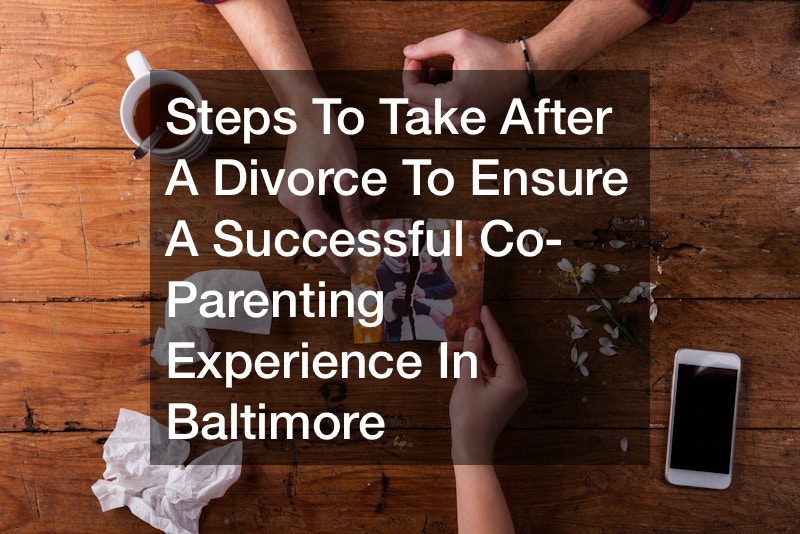
Going through a divorce is never easy, especially when children are involved. It’s essential to make the best decisions for your family, including establishing a successful co-parenting experience with the help of a Baltimore family law lawyer. Explore the steps in this comprehensive guide you can take after a divorce to ensure that you and your ex-spouse are on the same page and working together for the benefit of your children. Learn all about various aspects, from seeking legal advice from the best divorce lawyers in Baltimore to maintaining a positive environment, all while navigating the divorce fast track in Baltimore.
Consulting a Baltimore Family Law Lawyer
When going through a divorce, the first thing to do is consult with a family law lawyer. A qualified Baltimore family law lawyer will guide you through the process and make certain that your interests are protected. They also provide valuable information about the divorce fast track, which saves time and money. Don’t underestimate the importance of having a trusted Baltimore family law lawyer by your side during this challenging time.
A Baltimore family law lawyer will also work with you to navigate the complex legal system and help you understand the implications of each decision. They provide emotional support, which is crucial during this typically emotional time. In addition, the best divorce lawyers in Baltimore will work diligently to guide and assist you in achieving the best possible outcome in your case.
Hiring The Best Divorce Lawyers in Baltimore

In addition to a Baltimore family law lawyer, you’ll need to hire a divorce lawyer who specializes in handling divorce cases. They can guide you through the legal process and help you understand your rights and obligations. A skilled divorce lawyer will work to ensure that your divorce is resolved as quickly and amicably as possible, allowing you to move forward with your life and focus on your children. The best divorce lawyers in Baltimore work to ensure the process goes as smoothly as possible. A Baltimore family law lawyer is aware of new Maryland divorce law and can ensure you are doing the best for you and your family.
Navigating Custody Issues in Baltimore
A custody lawyer is another vital resource to have on your side during the divorce fast track. They can help you understand the various custody arrangements available and work with you to develop a parenting plan that meets your children’s needs. Additionally, they can advocate for your rights as a parent in court, ensuring that your voice is heard and your concerns are addressed. A lawyer is aware of new Maryland divorce law and how that applies to custody.
When working through custody issues, prioritize the best interests of the children. Consider their needs, preferences, and routines, and strive for stability and consistency. Be open to mediation and negotiation for resolving disputes amicably. Maintain a cooperative relationship with your ex-spouse to support co-parenting efforts. Keep records of interactions, agreements, and relevant documents. Seek support from family, friends, and professionals, such as therapists, to ensure emotional well-being during the process.
Choosing the Right Baltimore Family Law Lawyer

Not all family law attorney services are created equal. It’s essential to find a legal team that understands your unique circumstances and can provide the guidance and support you need during the divorce fast track. Look for the best divorce lawyers in Baltimore with experience in family law and divorce cases and who has a proven track record of success in helping clients navigate the complexities of the legal system.
Planning Your Move

If your divorce requires you to move to a new home, it’s essential to plan your move carefully. Hiring a local moving service can make this process much more manageable. They will pack, transport, and unpack your belongings efficiently. It allows you to focus on your children’s needs and adjust to your new life.
Create a moving timeline to organize tasks and set deadlines. Declutter before packing, donating or selling unwanted items. Gather packing materials like boxes, bubble wrap, and packing tape. Be sure to label boxes clearly, listing contents and destination rooms. Also, notify important parties of your change of address, including banks, utilities, and schools.
Prepare an essentials box with necessities for the first days in your new home. Make sure to plan for any potential disruptions to your children’s routine, such as school transportation. Finally, explore your new neighborhood, identify key facilities, and establish support networks to ease into the changes.
Residential Services for a Smooth Transition
For a more comprehensive moving solution, consider hiring residential moving services. These professionals can handle everything from packing and unpacking to transporting your belongings and setting up your new home. By choosing a reputable residential moving service, you can ensure a smoother transition.
Selecting the Right School
When choosing a local private school for your children following a divorce, it is crucial to carefully evaluate various aspects of each institution. Begin by examining the academic programs, ensuring that the curriculum, teaching methods, and subject offerings cater to your child’s interests and learning style. Additionally, look for schools that offer diverse extracurricular activities, as this will enable your child to have a well-rounded experience.
It is also important to consider the school culture and values, making sure they align with your family’s beliefs. Investigating the qualifications and experience of the faculty can give you insight into the quality of education your child will receive. Lastly, confirm that the school provides adequate student support services, such as counseling, special education resources, and tutoring programs, to meet your child’s individual needs.
Planning a Fun Outing

One way to help your children adjust to the changes brought about by divorce is by creating positive memories together. For example, plan a visit to a fun museum for kids in your area, where you can spend quality time together while learning and exploring. This shared experience can help strengthen your bond and demonstrate that, despite the divorce, you will always be there for them.
Creating a Parenting Plan
A well-thought-out parenting plan is crucial for successful co-parenting. Sit down with your ex-spouse and outline details such as visitation schedules, decision-making responsibilities, and communication methods. By addressing these issues upfront, you’ll avoid confusion and potential conflict down the road.
Include provisions for holidays, special occasions, and vacations, ensuring equitable distribution of time. Establish guidelines for child-related expenses, educational and extracurricular activities. Detail emergency procedures, medical care, and insurance coverage. Set boundaries for introducing new partners and addressing behavioral issues. Regularly reevaluate and adjust the plan as children grow and circumstances change.
Establishing Consistent Communication Channels
Maintaining open and consistent communication with your ex-spouse is vital for successful co-parenting. Establish reliable communication channels, such as email or text messages, and commit to using them regularly. This will ensure that both parents are informed about their children’s lives and can collaborate effectively.
Keeping Your Children’s Best Interests at Heart
Keeping your children’s best interests at heart is essential for creating a successful co-parenting relationship. This means putting your children’s needs ahead of your own personal interests or conflicts with your ex-spouse. When making decisions related to co-parenting, it’s important to consider the impact they will have on your children and prioritize their emotional, physical, and developmental well-being.
It could involve compromising on certain issues or putting aside personal differences with your ex-spouse to create a supportive and loving environment for your children. Remember that co-parenting is not about who wins or loses, but rather about creating a stable and supportive environment for your children to grow and thrive in. By keeping their needs at the forefront of your decisions, you can help them feel loved, supported, and secure, even during the most difficult of times.
Attending Co-Parenting Counseling Sessions in Baltimore
Attending co-parenting counseling sessions is an effective way to improve your co-parenting relationship and create a healthy and positive environment for your children. A trained counselor will provide a neutral space for you and your ex-spouse to discuss any issues or concerns related to co-parenting. They can also help you develop effective communication skills and strategies to resolve conflicts and reach agreements.
In addition, counseling will help you understand the impact of divorce on your children and how to support them. Finally, attending co-parenting counseling sessions is an opportunity to check in on your progress and identify areas for improvement in your co-parenting relationship. Ultimately, co-parenting counseling aims to create a healthy and supportive environment for your kids, where they can thrive and feel supported by both parents. By attending counseling sessions, you are working towards this goal and ensuring that your children’s needs remain a top priority.
Celebrating Milestones and Special Occasions Together
Celebrate your children’s milestones and special occasions together as a family whenever possible. This can include birthdays, graduations, and holidays. By sharing these moments, you reinforce the message that both parents are still actively involved in their lives. There’s something to be said about parents that can get along for the sake of their kids, and your children will thank you for it.
Encouraging Your Children’s Relationship with Their Other Parent
Promote a healthy relationship between your children and their other parent by encouraging regular communication and visits. Always speak positively about your ex-spouse in front of your children. Speaking negatively will only create more problems and potentially paint you in a poor light later when they’re older and able to think about this delicate time from a more mature and independent point of view. Instead, foster an environment where they feel comfortable discussing their feelings and experiences with both parents.
Establishing New Family Traditions
Establishing new family traditions after a divorce is a great way to create a sense of continuity and stability for your children. These traditions can be anything from a weekly movie night or game night to a special holiday activity or annual vacation. Involve your children in the planning process and encourage them to contribute their ideas.
By creating these new traditions together, you also create a sense of belonging and unity within your family. The celebrations will help your children adjust to the changes in their family structure and feel connected to both parents. As time passes, the traditions may become some of your children’s most cherished memories, and they might even pass them down to their families one day!
Fostering a Supportive Network
Surround yourself and your children with a supportive network of friends and family who can offer emotional support and practical help during this transition. The network provides a sense of stability and consistency for your children. In addition, it teaches them there will be others there to turn to if they feel like they need someone in their corner later on.
Managing Your Emotional Well-being
Obviously, going through a divorce is emotionally draining, and it’s essential to prioritize your own well-being. Seeking therapy or joining a support group can provide a safe space to process your emotions and gain valuable insight and advice from others going through similar experiences. It can also help you develop healthy coping mechanisms and learn new skills for managing stress and anxiety.
Taking care of your own emotional needs will benefit your children by modeling healthy behavior and reducing the likelihood of negative interactions. Additionally, focusing on self-care will make you feel more energized and present when spending time with your children, enhancing the quality of your relationship with your little ones. Remember that prioritizing your own emotional well-being is not selfish but rather an essential step towards creating a healthier, happier family dynamic.
Reassessing and Adjusting Strategies
Regularly reassessing and adjusting your co-parenting strategies is crucial for meeting your children’s changing needs. As your children grow older, their schedules, interests, and developmental needs may fluctuate, which may require adjustments to your co-parenting arrangements. Maintaining open communication with your ex-spouse and being flexible and willing to compromise can help you make changes that work for everyone involved.
It’s important to keep in mind that co-parenting is a dynamic process, and what works one year may not work the next. Reassessing your co-parenting strategies on a regular basis will allow you to identify and address any issues or challenges that may arise. Additionally, it can help you maintain a positive relationship with your ex-spouse by demonstrating your willingness to work together. You will create the most successful co-parenting relationship by keeping an open mind and regularly reassessing and adjusting your co-parenting strategies.
It’s no secret that the journey to successful co-parenting after divorce is filled with challenges and adjustments. However, by following the steps outlined in this guide and adding even more ideas that you find suitable along the way, you can create a strong foundation for a positive co-parenting experience that benefits both you and your children. In the end,
It’s essential to have a positive mindset and approach towards co-parenting. Focus on your children’s best interests and try to communicate constructively with your ex-spouse, and everyone will win.





